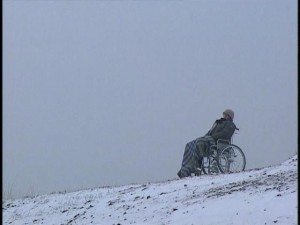At what point do we declare that the near saturation media coverage of the Newton massacre, however understandable initially, has become not just politically opportunistic on the part of a nearly unanimous gun control bloc but also voyeuristic? Perhaps any coverage of such a tragedy inevitably contains elements of voyeurism from the very start—humans compassionately grieve for and sympathize with the victims, but also are drawn to look upon others’ suffering with a horrified fascination. That fascination includes some element of “Phew, I’m glad that wasn’t me” (as well as: “Why him and not me?”). The Greek tragedians understood the mesmerizing effect of other people’s travails. The Newton coverage to me is starting to enter the realm of arguably gratuitous detail regarding matters best left to private sorrow.
The media also have an interest in selling their wares, obviously, and so will symbiotically exploit their audiences’ voyeuristic tendencies as long as they can.
Part of the answer to how much coverage of the massacre is justified—and by extension, what the public policy response should be–requires precisely defining what happened there. If we categorize it narrowly as belonging to the subset: schoolyard massacres, those are incredibly rare. The New York Times reports:
Research on mass school killings shows that they are exceedingly rare. Amanda B. Nickerson, director of a center that studies school violence and abuse prevention at the University at Buffalo, said studies made clear that American schools were quite safe and that children were more likely to be killed outside of school.
How much should we change our laws to prevent an event that almost never happens, especially in comparison to the number of school days logged by American children each year? Gun control advocates thus want to put the Newton massacre in a broader context of gun violence more generally. I have almost no gun rights instincts, so my knee-jerk response to the tragedy was: “Enough is enough. The NRA’s got some ‘splainin’ to do here.” Nevertheless I well understand the substantial arguments of the gun lobby against further regulation. Homicides have dropped enormously over the last thirty years, and not just because of better emergency care treatment. Gun violence is not getting worse, it’s getting better. And as Steven Pinker has shown, violence in general has plummeted over centuries. Further restrictions on gun purchases will be greatly overinclusive, especially if we define the problem we are trying to avert as school massacres. Almost no one buying semi-automatic weapons and ammo will go on to murder school children. But the proportion of legal gun owners who go on to kill anyone is also very low.
The extent to which one tolerates over-inclusion and under-inclusion in a law depends on your preexisting world view—if you’re already inclined towards gun regulation, for example, you won’t care so much if the proposed solution would burden many innocent gun owners and would not necessarily have prevented the current tragedy. Because I don’t personally value gun rights, I am easily prepared to support a potentially infinite range of further restrictions on ownership. But I realize that such a position is purely idiosyncratic, if not selfish. Suggest something greatly overinclusive about something I do care about, and I will be much more insistent on a tight fit between the law and the alleged problem. When Al Sharpton proposes to shut down proactive policing in New York City after an officer mistakenly shoots an unarmed man, for example, I do rebel, and will argue the utter rarity of such shootings compared to the tens of millions of officer-civilian contacts a year and the costs of further restricting officers’ ability to prevent crime.
Short of disarming everyone, it’s hard to see how to prevent such unusual tragedies like we just experienced—especially where the gun user was not the lawful gun owner. Perhaps I’ve missed something, but nothing seems to suggest that Adam Lanza was within the range of even greatly liberalized involuntary commitment laws, so the safe harbor of hoping that stricter mental health laws or even more treatment would have prevented Sandy Hook seems unavailable.
Of course, the greatest victims of gun violence proportionally are blacks; there are more black homicide victims each year than white and Hispanic victims combined, even though blacks are only 12 percent of the population. Even the liberal media doesn’t care much about them. Blacks are also the greatest perpetrators of gun violence. In New York City, blacks commit 80 percent of all shootings, though they are 23 percent of the population. Whites commit 1.4 percent of all shootings, though they are 35 percent of the population. Blacks are underrepresented among gun owners. Policing, not gun laws, brought gun violence down in New York City since 1994. The one root cause that I would go after to lower black crime would be illegitimacy. But the New York Police Department managed to decrease homicides by 80 percent since 1993—twice the national average—without changing family structure one iota.
Left to my own devices, however, and reacting purely emotionally, I swing back into the gun control camp. There simply is no dispute that the U.S. is miles more violent than other advanced countries. Are guns a symptom or a cause of that violence? I don’t know. But in any case, do we really need all those guns? Taboo question in many circles, I know. If something is question of rights, “need” does not come into the question. And conservatives preach that we should be nonjudgmental about other consumer preferences. I am not supposed to question whether you “need” five SUVs or 63 pairs of Jimmy Choo stilettos. Still, I will not mourn if it gets harder to buy guns. The sounds of the machinery of the federal government cranking into gear must be terrifying to many a libertarian, but is a federal response really so inappropriate? I am agnostic on this. Legislation serves a symbolic as well as a technocratic function.
(However rare mass shootings are, Islamic terrorist shootings—or any kind of domestic Islamic terror event–are even rarer. Conservatives have been just as quick to jump on the policy bandwagon to prevent Islamic terrorism, an exceedingly unusual occurrence, and in so doing to impose far greater costs and consequences, as liberals are with regards to highly publicized shootings.)
 As much as I may grumble about the Economist’s snooty and irritating Davos/Brussels liberalism, it still remains an invaluable resource, not least its Christmas issue. This year’s included a haunting, terrifically written piece on the 19th Century war that nearly destroyed Paraguay (trust me on this: as a tale of folly and horror, it’s difficult to match), and then this tale:
As much as I may grumble about the Economist’s snooty and irritating Davos/Brussels liberalism, it still remains an invaluable resource, not least its Christmas issue. This year’s included a haunting, terrifically written piece on the 19th Century war that nearly destroyed Paraguay (trust me on this: as a tale of folly and horror, it’s difficult to match), and then this tale:
 Grim reading, I fear, for New Year’s Day, but the (London) Daily Mail has a report
Grim reading, I fear, for New Year’s Day, but the (London) Daily Mail has a report  We’ve heard a lot from the Roman Catholic church of late about how its “religious liberty” is supposedly infringed by the Obamacare “contraception mandate”. It’s a dodgy and unconvincing argument for any
We’ve heard a lot from the Roman Catholic church of late about how its “religious liberty” is supposedly infringed by the Obamacare “contraception mandate”. It’s a dodgy and unconvincing argument for any  How to mark Christmas, grandest and jolliest and most syncretic of festivals, this year?
How to mark Christmas, grandest and jolliest and most syncretic of festivals, this year? The Pope, writing in the Financial Times
The Pope, writing in the Financial Times